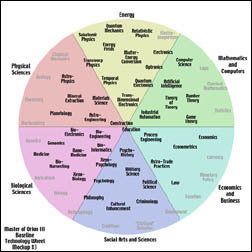|
Technology
"Players will not be able to say, 'in two more turns
I'll get the Kill-O-Zap Device and then look out!' Instead, they're
going to have to make the best of things and use all the other tools
in their toolbox to stall for time while they wait hopefully for
the Kill-O-Zap Device Project to bear fruit."
1. General
2. Key Concept: Opacity
3. Refinement
4. Project Funding and Research Income
5. Spying
6. Other Factors
Here you'll find a glossary of terms
1.
 Science
is not a unidimensional entity. Research in many areas is affected
by that in other related fields. And, occasionally, a scientific
advance can be prompted by what appears at first to be a rather
indirect connection between fields. This is the concept underlying
the Technology Wheel. Science
is not a unidimensional entity. Research in many areas is affected
by that in other related fields. And, occasionally, a scientific
advance can be prompted by what appears at first to be a rather
indirect connection between fields. This is the concept underlying
the Technology Wheel.
There are the following research areas:
A Biological Sciences
B Mathematics and Computers
C Macrosciences
D Microsciences
E Social Arts and Sciences
F Economics and Business
Many players won't want to set every research project so you'll
be able to adjust slider bars for the 6 main research areas to give
general direction to the research teams. Of course you can dig deeper
under the hood, and open up the display to show the current research
priorities on each field within each main research area. Sliders
for each field can be adjusted individually.
Various Leaders (Military, etc.) throughout the player's civilization
will regularly generate needs for new or improved technologies.
The player will see a queue of desired projects, which he can examine
and reorganize, as appropriate, or delete items which are not desirable.
Or, the player can simply let the AIs take care of the details and
focus on other parts of the game.
2.
In many games of this genre (like MoO1 & MoO2) you'll get exact
datas when which technology will be discovered. Not so in Master
of Orion 3. Like stated in the first few lines of this document,
no one knows exactly how close to completion a research project
is. At best, one can query their scientific community about a Research
Category or Program and get a vague answer back about how progress
is coming along and how soon things might be completed.
This does not only add excitement, it also helps the player against
enemy spies. When something is discovered, it remains a Black Box
Discovery until it is actually employed in some way. What this means
is that spies will have a far more difficult time stealing secrets
that have yet to be generally employed. Ones that have been in use
in many places over a period of time will be much easier to acquire.
3.
Technologies can be improved without inventing completely new ones.
Refinement is quite simple: once the player completes a given Advance,
continued fundamental research will reduce the size or cost of the
Advance. Each Level of additional research in the primary field
for the Advance will affect these parameters by a defined amount.
So if we finished researching a nuclear missile, it'll take less
space and get cheaper and cheaper by every fundamental research
level in the primary research field, where you've researched the
nuclear missile.
This concept was known as Miniaturization in Master of Orion II,
but has been renamed Refinement in this game because of its more
general applicability.
4.
Research "income" is derived from two primary sources, government
spending on research and Research Points generated by Research facilities.
Their sum is allocated (via slider bars) to fund Fundamental Research
in each Field as well as all Applied Research.
How fast your research teams work, depends on the Project Funding
Level. Along with the description of each project are estimates
of the time/cost and "confidence".
The time/cost estimate recommends what level of funding will "fully
fund" the project for the fastest, most cost efficient research.
Options to fund at higher and lower levels will also be presented
along with revised completion and confidence estimates.
Confidence estimates are subjective assessments of the "risk" of
that project. In order to minimize risk, you can research additional
fields of that research area until the risk of failure drops to
nearly zero.
5.
Other option of obtaining technologies are being diplomatic and
buying them, or stealing them from other civilizations. In that
case, you'll probably be faster than if you'd have tried to research
it on your own, and possibly for a lower cost.
But everything has a drawback - it could happen that your scientists
don't truely understand the new technology. Then you'll be able
to make copies of the item, but further discoveries will become
more and more difficult to achieve naturally.
6.
There are several other factors influencing your success in researching.
The education level, the governments, the religion - every race
will have its preferred areas.
All races, however, will fear the advent of too many new technologies
changing their lives too quickly. If a civilization is too aggressive
in applying its research, there could be social backlash.
For some more "Under the Hood" information follow
this
link (this links leads off-site).
|



